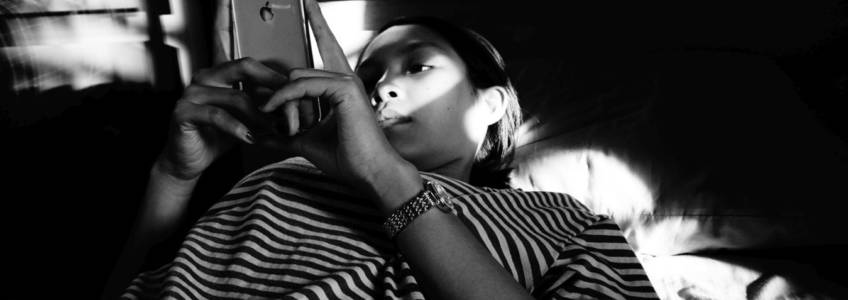Sleep texting is exactly what it sounds like. It’s is a phenomenon when people send or reply to text messages – you guessed it, in their sleep. Sleep texting has arisen and has become increasingly more common in the last decade, with the advance and the increasing prevalence of smartphones in our lives. If you’ve ever woken up to find a text you sent to a friend you have no memory of writing, you know what it is.
How is it possible to text someone in your sleep? If this scenario seems wild to you, that’s a sign that texting is just not an integral part of your life as it is for many people, and your relationship with your phone is not as automatic.
Sleep texting is not that different from other parasomnias – a kind of sleep disorders when a person performs movements and behaviours during their sleep that they might perform automatically during the day but that shouldn’t happen during sleep. The more known parasomnias include sleepwalking, sleep talking, sleep eating, groaning, night terrors, teeth grinding, jaw clenching – and occasionally more dangerous ones like sleep driving. All these have been around for a while, and as technology adds new dimensions and new regular behaviours to our lives, things like sleep texting (and even sleep shopping) are becoming common because texting and shopping online are just regular things we do during the day.
The reason that parasomnias in general happen is that while you might be sleeping, parts of your brain may still be awake, so you’re engaging in the same behaviours you engage while you’re awake.
Sleep Texting and Smartphone Use
Using technology in your sleep is not entirely new either. What seems to be the first documented case of sleep emailing took place nearly 10 years ago and was reported in a Journal of Sleep Medicine. In that case, the patient reported sleep emailing after taking an increased dose of sleep medication.
But in a matter of 10 years, sleep texting has turned from sensational to a pretty common phenomenon. Researchers from the Villanova University recently conducted a study surveying sleeping habits of college students. In an article published in the Journal of American College Health, they report that as much as 25% of college students surveyed report sleep texting, and the majority of them (72%) do not remember doing so afterwards.
The rise of sleep texting is of course not surprising given the prevalence of phones in our lives. According to Deloitte’s 2018 Global Mobile Consumer Survey, 85% of Americans now own a smartphone, and they check it on average 52 times a day (that’s up from 47 times the year before). In addition, 60% of the respondents aged 18-to-34-year-olds admitted they’re hooked on their devices.
For instance, one of the respondents in the Villanova college students study commented that she resorted to wearing mittens to bed to prevent sleep texting, because “moving the phone from being in my bed to next to the bed is not an option, I have to keep my phone with me.”
Of course with many of us attached to our phones for the large part of the day and responding to each notification as soon as it arrives, it is not surprising that our phones have become an extension of ourselves like our arms and legs. As a consequence, our reaction to the sound of a text notification on our phone has become automatic: we grab the phone and immediately begin to text back.
As a matter of fact, people who sleep text usually do so in response to the sound of a text notification on their phone. It’s quite rare for people to actually initiate a text conversation in their sleep although it does happen too.
Also, as with sleep talking, most of the time the texts people send in their sleep are a total gibberish, but occasionally they can have logical conversations in their sleep.
Of course, unlike sleep talking where you’re embarrassing yourself in front of only one or at most a couple of people who know you well, sleep texting is an opportunity to embarrass yourself in front of a much wider audience. Just imagine what would happen if sleep texting turned into sleep tweeting!
Causes of Sleep Texting
While the immediate danger of sleep texting is embarrassing yourself in front of your friends, relatives and co-workers, it is possibly a sign of a bigger problem, your inability to relax and get into a deep sleep.
Stress, poor sleep quality and excess daytime activity are all factors that affect your sleep quality and may all be possible causes of sleep texting. The Villanova sleep-texting study specifically linked students’ sleep-texting to the quality of sleep and the level of exhaustion and stress the students had during the day. It makes sense, of course. If you’re stressed, or overly active during the day, and don’t take time to unwind, you’re less likely to be able to relax and fall into deep sleep come nighttime.
Sleep deprivation is another factor that makes you more likely to sleep text. If you’re already sleep deprived, it might be harder for you to fall into deep sleep, and you’re more likely to respond to outside auditory stimuli like a phone notification.
Parasomnias may also be hereditary, even if it’s not necessarily sleep texting. So if your mom used to sleepwalk, you’re more likely to exhibit parasomnias, and if you’re used to regularly text during the day and have your smartphone nearby at night, this might manifest as sleep texting.
Other factors that may contribute to parasomnias in general and sleep texting in particulal are the use of certain medications, alcohol and sleep breathing disorders, such as obstructive sleep apnea.
How to Prevent Sleep Texting
To know more about Sleep Texting.






